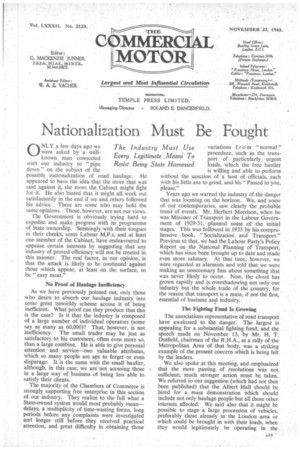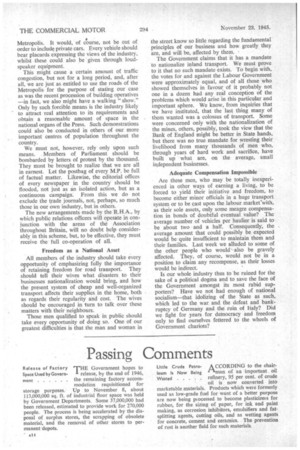Nationalization Must Be Fought
Page 15

Page 16

If you've noticed an error in this article please click here to report it so we can fix it.
NLY a few days ago we were asked by a well known man connected with our industry to "pipe down" on the subject of the possible nationalization of road haulage. He appeared to have the idea that the more that was said against it, the more the Cabinet might fight for it. He also hinted that it might all work out satisfactorily in the end if we and others followed his advice. There are some who may hold the same opinions. Those, however, are not our views.
The Government is obviously trying hard to expedite and make progress with its programme of State ownerstp. Seemingly with their tongues in their cheeks, some Labour M.P.s, and at least one member of the Cabinet, have endeavoured to appease certain interests by suggesting that any industry of proved efficiency will not be treated in this manner. The real factor, in our opinion, is that the attack is likely to be continued against those which appear, at least on the surface: to be "easy meat."
No Proof of Haulage Inefficiency As we have previously pointed out, only those who desire to absorb our haulage industry into some great unwieldy scheme accuse it of being inefficient. What proof can they produce that this is the case? Is it that the industry is composed of a large number of individual operators (some say as many as 60,000)? That, however, is not inefficiency. The small trader may be just as satisfactory to his customers, often even more so, than a large combine. He is able to give personal attention and service—two valuable attributes, which so many people are apt to forget or even disparage. It is the same with the small haulier, although, in this case, we are not accusing those in a large way of business of being less able to satisfy their clients.
The majority of the Chambers of Commerce is strongly supporting free enterprise in this section of our industry. They realize to the full what a State-owned system would most probably mean— delays, a multiplicity of time-wasting forms, long periods before any complaints were investigated and longer still before they received practical attention, and great difficulty in obtaining those variations f rom " normal " procedure, such as the transport of particularly urgent loads, which the free haulier is willing and able to perform without the sanction .of a host of officials, each with his little axe to grind, and his "Passed to you, please."
Years ago we warned the industry of the danger that was looming on the horizon. We, and some of our contemporaries, saw clearly the probable trend of events. Mr. Herbert Morrison, when he was Minister of Transport in the Labour Government of 1929-31, planned some of the initial stages. This was followed in 1933 by his comprehensive book, "Socialization and Transport." Previous tO that, we had the Labour Party's Policy. Report on the National Planning of Transport, which has since been brought up to date and made even more salutary. At that time, however, we were regarded as alarmists and told that we were making an unnecessary fuss about something that was never likely to occur. Now, the cloud has grown rapidly and is overshadowinac not only our industry but the whole trade of the country, for the reason that transport is a main, if not the first, essential of business and industry.
The Fighting Fund Is Growing The associations representative of road transport have awakened to the danger. The largest is appealing for a substantial fighting fund, and the speech made on November 13, by Mr. H. T. Duffield, chairman of the R.H.A., at a rally of the Metropolitan Area of that body, was a striking example of the present concern which is being felt by the leaders.
We also spoke at this meeting, and emphasized that the mere passing of resolutions was not sufficient; much stronger action must be taken. We referred to our suggestion (which had not then been published) that the Albert Hall should be hired for a mass demonstration which should include not only haulage people but all those other interests affected. We said also that it might be possible to stage a large procession of vehicles, preferably those already in the London area or which could be brought in. with their loads, when they would legitimately be operating in the Metropolis. It would, of Course, not be out of order to include private cars. Every vehicle should bear placards expressing the views of the industry, whilst these could also be given through loudspeaker equipment.
This might cause a certain amount of traffic congestion, but not for a long period, and, after all, we are just as entitled to use the roads of the Metropolis for the purpose of stating our case as was the recent procession of building operatives —in fact, we also might have a walking "show." Only by such forcible means is the industry likely to attract real attention to its requirements and obtain a reasonable amount of space in the national organs of the Press. Such demonstrations could also be conducted in others of our more important centres of population throughout the country.
We must not, however, rely only upon such means. Members of Parliament should be bombarded by letters of protest by the thousand. They must be brought to realize that we are all in earnest. Let the postbag of every M.P. be full of factual matter. Likewise, the editorial offices of every newspaper in the country should be flooded, not just as an isolated action, but as a continuous campaign: From this we do not exclude the trade journals, not, perhaps, so much those in our own industry, but in others.
The new arrangements made by the R.H.A., by which public relations officers will operate in conjunction with the areas of the Association throughout Britain, will no doubt help considerably in this scheme, but, to be effective, they must receive the full co-operation of all.
Freedom as a National Asset All members of the industry should take every opportunity of emphasizing fully the importance of retaining freedom for road transport. They should tell their wives what disasters to their businesses nationalization would bring, and how the present system of cheap and well-organized transport affects their supplies in the home, both as regards their regularity and cost. The wives should be encouraged in turn to talk over these matters with their neighbours.
Those men qualified to speak in public should take every opportunity of doing so. One of our greatest difficulties is that the man and woman in the street know so little regarding the fundamental principles of our business and how greatly they are, and will be, affected by them.
The Government claims that it has a mandate to nationalize inland transport. We must prove to it that no such mandate exists. To begin with, the votes for and against the Labour Government were approximately equal, and of all those who showed themselves in favour of it probably not one in a dozen had any real conception of the problems which would arise in this particular and important sphere. We know, from inquiries that we have instituted, that the last thing many of • them wanted was a colossus of transport. Some were concerned only with the nationalization of the mines, others, possibly, took the view that the Bank of England might be better in State hands, but there was no true mandate for wresting their livelihood from many thousands of men who, through years of hard work and sacrifice, have built up what are, on the average, small independent businesses.
Adequate Compensation Impossible Are these men, who may be totally inexperienced in other ways of earning a living, to be forced to yield their initiative and freedom, to become either minor officials in a huge transport system or to be cast upon the labour market.with, as their sole assets, only some meagre compensation in bonds of doubtful eventual value? The average number of vehicles per haulier is said to be about two and a half. Consequently, the average amount that could possibly be expected would be quite insufficient to maintain them and their families. Last week we alluded to some of the other people who would' also be gravely affected. They, of course, would not be in a position to claim any recompense, as their losses would be indirect.
Is our whole industry thus to be ruined for the sake of a political dogma and to save the face of the Government amongst its most rabid supporters? Have we not had enough of national socialism—that idolizing of the State as such, which led to the war and the defeat and bankruptcy of Germany and the ruin of Italy? Did we fight for years for democracy and freedom only to find ourselves fettered to the wheels of Government chariots?




















































